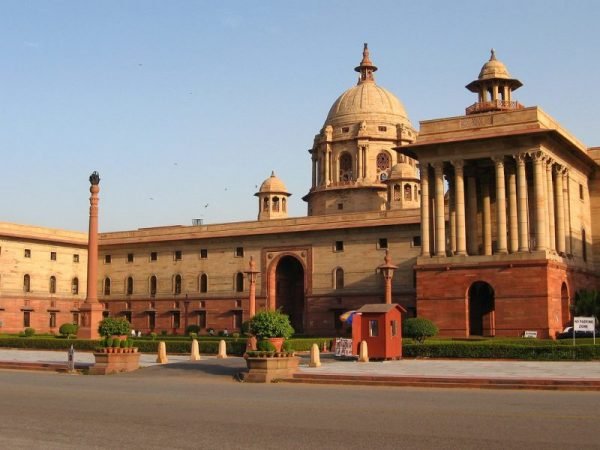Political rhetoric has no place in Diplomacy

Political rhetoric may be all right in domestic politics, but certainly not right in diplomacy/international relations when the country is facing two powerful and nuclear weaponised sworn enemies from two sides with long borders which are partly porous and inhabitable. In this case, I mean to say India versus China and Pakistan together two natural allies from point of view of (1) their common allergy against rising India (both economically and militarily), and (2) they themselves are being ruled by authoritarian rulers inimical to democracy. I say the present government in Pakistan is authoritarian -the designation may not be acceptable to many in India- simple because though the head of the government PM Imran Khan is elected, yet he like his many predecessors in past has reduced himself in a matter of governance of nation into a puppet of unelected and unaccountable powerful Army General. Again, Imran Khan has a paper-thin coalition-based majority –allegedly cobbled up by military- in Parliament’s lower house called National Assembly.

While China is certainly a strong military power (As per many sector-specific experts: In the world, now, China is next to the US in so far as a military power is concerned) compared to India, Pakistan is world number one in recruiting, training and exporting a large army of terrorists, who are indoctrinated to sacrifice their lives for 7th Century thoughts and are infamously christened as ‘Non-state Actors’ by the sponsor to rescue itself from punitive action by victim nations and world’s intergovernmental bodies. Of course, the escape route does not hold any ground after Uncle Sam’s Naval Seals entered deep into Pakistan territory -as close as garrison town Abbottabad- to catch and kill terrorist organization Al-Qaeda’s international head Osama-bin-Laden, responsible for daring and a horrendous terror attack on Super Power deep inside its territory, and later, taking the body for identification abroad and water burial in the sea, which was followed by Indian surgical strikes on terror launching pads in Pakistan Occupied Kashmir in 2016, and destruction of terror training infrastructure at Balakot through air raid in 2019 in response ‘Non-state Actors’ terror attacks on Indian security infrastructure and security forces.
Post-China incursion in Ladakh sector followed by Galwan Valley skirmish, in which India lost lives of its 20 soldiers including a Commanding Officer and China had a substantial undisclosed number of loss of its forces, in mid-June 2020 on highly uninhabitable Himalayan height, Indian Government has been domestically provoked by its opposition leaders and intellectuals time and again during the last four months to counter-attack and evict the incursion to which government only says there is no incursion into Indian territory. What is there i.e. Chinese incursion into buffer zone (maybe) with an objective to extend the existing buffer zone into Indian Territory, a strategy China used to follow during the previous regime in New Delhi and expanded its territory. As reported by Shiv Aroor in Headline Today dated September 5, 2013, and updated on December 15, 2013, “China’s People’s Liberation Army (PLA) has ‘incrementally’ occupied nearly 640 square km of an area on the Line of Actual Control (LoAC) in Ladakh in the past few months”. This shocking revelation came in a report submitted by the National Security Advisory Board (NSAB) to the Prime Minister’s Office in 2013. Headlines Today has accessed the details of the damning report, submitted by the former foreign secretary and NSAB chairman Shyam Saran to the PMO on August 12, 2013. According to the Shyam Saran report, “Patrolling limits set by incremental PLA area denial in eastern Ladakh region of Jammu and Kashmir have now become the de facto LoAC.”

Now, to those, who are provoking the government to act against May 2020 China incursion into buffer area, questions may be asked, “Where were they when the above-quoted incursions, come to light in 2013 only, had been taking place for years and India lost 640 SqKM in the process? Was their silence purchased by some vested interest-based in abroad? Or that was due to secret 2008 MoU which came to light in 2020 only?” In 2013, China’s GDP was $9.5 Trillion, now the same is $14 Trillion. Now, the Indian economy is badly destabilized due to Covid19 pandemic which might have been exported by the enemy with a strategic objective. Though India’s economy during the period (between 2013 and 2020) has seen a tremendous increase, the same can’t match the economic growth of a nation lead by the authoritarian regime. Means democratic India has its own limitations in so far as their national economic and military prospects are concerned in compare to authoritarian regime ruled nation. And, at the same times, democratic India has better leverage compare to authoritarian China in the world, which has got incremental growth in democratic governance over past several decades (As per data compiled by Max Roser, Our World in Data, University of Oxford: In 1950, there were 25 democracies and 130 autocracies; but, in 2018, there were 99 democracies and 80 autocracies), in so far as international relation is concerned.
In a democratic world environment, one should not forget that rhetoric diplomacy does not bear fruits. In China’s 71 years of one-party authoritarian rule, Xi Jinping is the second belligerent supreme leader after Mao Zedong. He, since his ascendancy to the supreme power of the nation in 2013, has been leading his nations threat to almost all neighbours, and already achieved the virtual occupation of resource-rich vast the East and the South China Sea, which are world’s major shipping routes as 30% of world sea trade passing through these two seas, ignoring a large number of littoral nations claims as per existing international law governing seas of the world. If the then (2013) India’s ruling parties (10+ parties coalition) acted with the seriousness the kind they have been demanding after Galwan skirmish, China would have been warned of India’s seriousness to its territorial integrity much earlier.

After October 6, 2020 held QUAD Foreign Ministers meeting in Tokyo, India’s eminent strategic thinker, author and commentator, Prof. Brahma Chellaney alleged in his tweet, “It speaks for itself that, in their Quad-meeting opening remarks, Pompeo slammed ‘CCP’s exploitation, corruption and coercion’ in, among other places, the Himalayas but Jaishankar-far from naming China-made no mention even indirectly that India is a victim of China’s aggression.” Similar allegations many leaders, commentators, and civil society activists also have made against PM Modi for not naming China when he has been speaking about skirmishes in Ladakh. I don’t know whether India’s present leadership in government follow the dictum laid by Indira Gandhi in 1971 (Indira Gandhi told to the Lok Sabha, “In a serious moment like this, the less we as a government say, I think the better it is”, and in the Rajya Sabha, she told, “A wrong step, a wrong word, can have an effect entirely different from the one which all intend”) before the Indo-Pak war or not, but I believe rhetoric as done by US Secretary of State Mike Pompeo in Quad meeting that Prof. Chellaney quoted or after QUAD and back in the US he said ‘China amassed 60,000 soldiers at India border and India absolutely need the US to be their ally and partner in this fight’ is not right kind of diplomacy for India to copy as it faces two formidable enemies in its northern and western borders when the nation is struggling to rescue from the dreaded pandemic and its related economic fall-outs. Here, one should not forget that Mike Pompeo’s country is not facing any immediate threat to his country’s geography that other members of the Quad such as India and Japan are encountering due to China’s aggression. Rather, in my view, Mike Pompeo may have in his mind millions of Indian origin voters’ votes in ensuing Presidential election back home. If later is the issue, why should Indian swayed by Pompeo rhetoric endangering India’s relation with the US in the event of a change of occupant in The White House post-November 3, 2020 in a closely contested election when it is a known fact that Joe Biden and Kamala Harris have alleged ‘Left’ leaning? Was Indira Gandhi rhetorical in 1971? Was the situation less provocative then? Had she named Pakistan and its ally the then The White House occupant President Richard Nixon, who had gone to the extent of deploying his nation’s nuclear powered 7th Fleet in the Bay of Bengal against the wishes of the US civil society and public opinion? Further to note that, in 1971, when Indira Gandhi had the complete backing of country’s opposition parties, civil society and media; present government, which has to take the challenge of much bigger power now, does not get any support from the main opposition party. Should ideological difference divide a nation’s politics when the nation is facing huge external threats during these days of a wide-spread pandemic? Many of them are found indulging in war-mongering, and some even went to the extent of espousing enemy causes, mostly rhetorical. Here, I would like to quote Russian Ministry of Foreign Affairs tweet dated October 8, 2020, that says, “It is believed that nations do not have permanent friends or enemies, they only have interests. Russian-Indian ties disclaim this belief, presenting a unique example of ages-old friendship based on equality”. Note the timing of this tweet, just days after the latest Quad meet! Further, here, I would like to mention, “Politicians do not have permanent friends or enemies; they only have interests. So also, lately I strongly feel, journalists and civil society activists like politicians only have personal interests.” During this rein of personal interests, the Indian Government is right not to be swayed by rhetorics, many trying hard to impose the same on it for their vested interest.


















